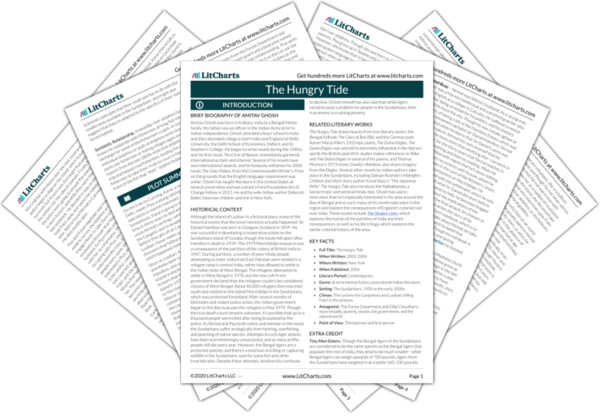Kusum Quotes in The Hungry Tide
I felt something change within me: how astonishing it was that I, an aging, bookish schoolmaster, should live to see this, an experiment, imagined not by those with learning and power, but by those without!
I was tempted to tell him what I thought of him, but it struck me with great force that I had no business to be self-righteous about these matters. Nilima—she had achieved a great deal. What had I done? What was the work of my life? I tried to find an answer but none would come to mind.
"Nirmal, you have no idea of what it takes to do anything practical," she said. "You live in a dream world—a haze of poetry and fuzzy ideas about revolution. To build something is not the same as dreaming it. Building is always a matter of well-chosen compromises."
The sight was almost unbearable for me at the moment; I felt myself torn between my wife and the woman who had become the muse I'd never had; between the quiet persistence of everyday change and the heady excitement of revolution—between prose and poetry.
Most haunting of all, was I overreaching myself even in conceiving of these confusions? What had I ever done to earn the right to address such questions?
I realized with a sense of shock that this chimerical line was, to her and to Horen, as real as a barbed-wire fence might be to me.
"Who are these people, I wondered, who love animals so much that they are willing to kill us for them […] it seemed to me that this whole world had become a place of animals, and our fault, our crime, was that we were human beings, trying to live as human beings always have, from the water and the soil."
"He loved the work of Rainer Maria Rilke […] Rilke said 'life is lived in transformation,' and I think Nirmal soaked this idea into himself in the way cloth absorbs ink. To him, what Kusum stood for was the embodiment of Rilke's idea of transformation."

Kusum Quotes in The Hungry Tide
I felt something change within me: how astonishing it was that I, an aging, bookish schoolmaster, should live to see this, an experiment, imagined not by those with learning and power, but by those without!
I was tempted to tell him what I thought of him, but it struck me with great force that I had no business to be self-righteous about these matters. Nilima—she had achieved a great deal. What had I done? What was the work of my life? I tried to find an answer but none would come to mind.
"Nirmal, you have no idea of what it takes to do anything practical," she said. "You live in a dream world—a haze of poetry and fuzzy ideas about revolution. To build something is not the same as dreaming it. Building is always a matter of well-chosen compromises."
The sight was almost unbearable for me at the moment; I felt myself torn between my wife and the woman who had become the muse I'd never had; between the quiet persistence of everyday change and the heady excitement of revolution—between prose and poetry.
Most haunting of all, was I overreaching myself even in conceiving of these confusions? What had I ever done to earn the right to address such questions?
I realized with a sense of shock that this chimerical line was, to her and to Horen, as real as a barbed-wire fence might be to me.
"Who are these people, I wondered, who love animals so much that they are willing to kill us for them […] it seemed to me that this whole world had become a place of animals, and our fault, our crime, was that we were human beings, trying to live as human beings always have, from the water and the soil."
"He loved the work of Rainer Maria Rilke […] Rilke said 'life is lived in transformation,' and I think Nirmal soaked this idea into himself in the way cloth absorbs ink. To him, what Kusum stood for was the embodiment of Rilke's idea of transformation."











